Beth Tabler's Blog, page 172
August 8, 2022
Review – The Fires of Vengeance by Evan Winter
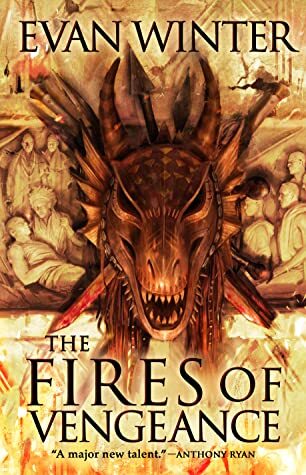 Whew, this was a rideeeeee. I felt so many emotions during this story and I read until late into the night to finish it. Usually when I’m reading a book that I enjoy this much, and I use my tabbing system, my green tabs run out first (the ones that represent enjoyment) but this time, I ran though an entire new pack of orange tabs (frustration/anger/eye-rolling), but amazingly this didn’t lessen my enjoyment of this story. In my first review I mention Tau was an extremely stubborn main character that is frustrating to read about, but that aspect of his character is absolutely necessary for the plot of this book and for his relationship to the other characters. That doesn’t change in this book and honestly he is frustratingly oblivious; though that does lead to some extremely funny situations throughout.
Whew, this was a rideeeeee. I felt so many emotions during this story and I read until late into the night to finish it. Usually when I’m reading a book that I enjoy this much, and I use my tabbing system, my green tabs run out first (the ones that represent enjoyment) but this time, I ran though an entire new pack of orange tabs (frustration/anger/eye-rolling), but amazingly this didn’t lessen my enjoyment of this story. In my first review I mention Tau was an extremely stubborn main character that is frustrating to read about, but that aspect of his character is absolutely necessary for the plot of this book and for his relationship to the other characters. That doesn’t change in this book and honestly he is frustratingly oblivious; though that does lead to some extremely funny situations throughout.
The expansion of the magic system and it’s integration with the training sequences led to some really interesting plot developments. I’m very much intrigued to see where Winter goes with it in the next book.
This book doesn’t hold back on its violence but it’s violence with a purpose. It really shows how blazing a road to vengeance sends ripples out into the world and has horrific consequences in kind. I also think this second book did a fantastic job of expanding the cast of characters. I cared very deeply for multiple people in this book and it was nice to not have to focus all my energy on Tau. I loved Queen Tsiora’s “handmaidens” and Themba, and I was also living for Uduak and Hadith. Having a more diverse cast with women and lgbtq characters was a refreshing addition to this second installment.
Honestly, it’s been a really long time since a book gripped me enough to keep me reading until 4am so on that alone, this book has to get a stellar rating.
4.5/5 stars.
Buy from Amazon
Fires of Vengeance•Fires of Vengeance•Fires of Vengeance•Fires of Vengeance•Fires of Vengeance•Fires of Vengeance•Fires of Vengeance•Fires of Vengeance•
The post Review – The Fires of Vengeance by Evan Winter appeared first on BEFOREWEGOBLOG.
#MusicMonday – Sea Lion by Sage Francis
Force of my love was strong
The sea lion laying down long
A song in the air
Why should singer care
I must have listened to this song a thousand times this year. The smoothness of the voice sets it off. If you dig it, listen to “The Best of Times.” Let me know what you think!
Sea Lion by Sage Francis
Force of my love was strong
The sea lion laying down long
A song in the air
Why should singer care
When singer can be among song
Force of my love was strong
The sea lion laying down long
A song in the air
Why should singer care
When singer can be among songMa, Ma, look what I did, Ma
Look what I did to my hands, I broke em
You gave me the stone, gave me the chisel
Didn’t say how to hold em
Didn’t say give away every piece of the puzzle
Till I was left with nothing
But I took it upon myself to crush it up and distribute the dust
Get in the bus, hop in the van
Jump in the water, crawl to the land
Build another castle out of the sand
Break it down and then I get into the saddle again
Going city to city I’m already lost, tell the boss
Who is new in town; I’m-a ride this horse till it bucks me off
And I’m forced to shoot it down
I’m-a take him out for some gasoline
I’m-a trade this cow for some magic beans
Make Mom proud of the deals that I’ve made
‘Cause I’m just a modern day Johnny Appleseed
But I’m glad that I never passed the genes
And I never put down the axe
Piano Man got a checkered dance floor
To grace and the painful look on his face
‘Cause the crowd is packed and the louder they clap
The less he is able to make the connection
Between what he sees when he hears certain notes
And the hurt that is shown in his facial expression
I don’t need your go-ahead to go ahead
No, I know no one said it was gonna be easy
But sweet Jesus, who wants to sleep with me?
Way too many moves to learn
But not enough people to put em on
Lookit, Mom, no hands
I built this suit of armor with wooden arms
Force of my love was strong
The sea lion laying down long
A song in the air
Why should singer care
When singer can be among song
Force of my love was strong
The sea lion laying down long
A song in the air
Why should singer care
When singer can be among songOh God I think I’m dead
I can’t see outside my head
Brains and bloods and cryptic gang men
Czars and warlords breaking bread
Thoughts are thought
What’s said is said
I thought that ‘fore you said it
I didn’t mean to think out loud
My tongue slipped but who let it?
Let it be, let me be, let me go, nah let me out
My manhood nods and whispers when my father screams and shouts
Dear dad I’m sad you’re dead
A new man standing in the pulpit
He bows before a wooden cross and forces praise the culprit
I’m a tenor in the choir but I sing a different song
Of how the where’s and why’s of now all prove I don’t belong
But I’m staying I’ve planted seeds and plan to watch them grow
I’ve watered all my wishes dreams fulfilled more seeds to sow
And I promise to learn to love the way I’ve learned to fear
To unknot all the inhibitions tangled in my hair
To let my ego mound in piles around the barber chair
And make a graceful exit from my vexed and troubled years
I’ve decided I’ve been invited to my own resort
Where knights can leave their armor neatly piled by the door
And every woman, child, and man will gather by the shore
And study how sea lions swim in cursiveForce of my love was strong
The sea lion laying down long
A song in the air
Why should singer care
When singer can be among song
Force of my love was strong
The sea lion laying down long
A song in the air
Why should singer care
When singer can be among song
The post #MusicMonday – Sea Lion by Sage Francis appeared first on BEFOREWEGOBLOG.
#SPSFC Interview with Benjamin J. Roberts Author of A Star Named Vega
 BWG: What do you think makes a good story?
BWG: What do you think makes a good story?
All good stories have at least one major explosion. A Star Named Vega has three major explosions, which is why it made it to the Finals of the SPSFC.
BWG: How did you get into writing? Were there any catalysts in your life that set you on your path to loving the written word?
I used to fill notebooks with stories when I was very young. Then the summer of 2000 saw the release of The Goblet of Fire and The Amber Spyglass. That was the summer I started writing novels.
BWG: What comes first for you, the plot or the characters, and why?
I love it when everything ties up at the end with a big thematic payoff. You really need to plan that stuff ahead. Then I bully my characters into following my plan. If they step out of line, I cut them in the next draft. Your characters should fear you.
BWG: How was your first SPSFC? If you have other books, Do you think you will submit them to future contests?
Following the SPSFC on Twitter was great fun, and it was amazing to have my work read by so many passionate reviewers and bloggers. That said, spending an entire year wondering when you’ll get cut is pretty exhausting. I don’t know if I could do it again!
BWG: What was the best part of the SPSFC experience?
There was something special about making it to the Semi Finals. It was the highest “Total Buzz” of the competition, given the number of authors still in the running. And those 30 books really did represent the best of indie science fiction (more so than the finalists, in my opinion). Among my favourites were Mazarin Blues by Al Hess, and ARvekt by Craig Lea Gordon.
BWG: For readers unfamiliar with your work, can you tell us about your SPSFC entry?
Aster is a Martian teenager with spray-painting fingernails, and she’s moving to the Vega System with her dad. Rel is a genetically engineered supersoldier with organic insect armour and a liquid metal hammer, and he’s on a mission to intercept their voyage. Things escalate from there.
BWG: Where did you get the idea for your book?
I was a bit tired of all the gloomy dystopian stories that were so popular a decade ago. For me the future has always been shiny and awesome, with flying cars and cool robots and free cake. I wanted to write that future.
BWG: What was your most brutal scene to write, and why?
Rel has a handful of brutal scenes. Lots of horrific injuries and emotional torment. His suffering was meant to counterpoint Aster’s awesome life, but maybe I was a bit too tough on the guy. Sorry, Rel.
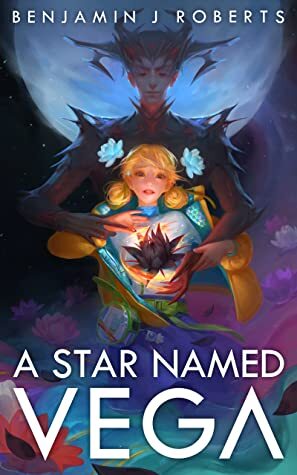 BWG: What is a significant way your book has changed since the first draft?
BWG: What is a significant way your book has changed since the first draft?
The story took me six years to complete, with too many drafts and rewrites to count. Almost everything has changed since that first draft, save for the image of a space pirate rescuing a girl on a ship.
BWG: There is usually research of some form when writing a Sci-fi novel. Were there any exciting bits of research or rabbit holes you went down writing the book?
The characters and themes are all based on the prophetic books of William Blake (try Googling “Fuzon”)
BWG: What do you have coming up in the future?
I’m not entirely sure, writing is difficult. I might try blacksmithing next.
Buy from Amazon
Benjamin J. Roberts•Benjamin J. Roberts•Benjamin J. Roberts•Benjamin J. Roberts•Benjamin J. Roberts•Benjamin J. Roberts•Benjamin J. Roberts•Benjamin J. Roberts•
The post appeared first on BEFOREWEGOBLOG.
August 6, 2022
Book Review: That Time I Got Drunk and Saved a Demon by Kimberly Lemming
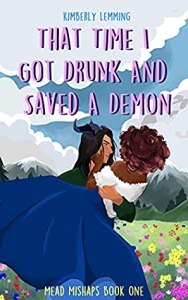 The title lets you know right away what you’re in for, and That Time I Got Drunk and Saved a Demon delivers the promised goods in this playful fantasy romance perfect for the beach or the couch. If you’re looking for deep lore and wildly innovative fantasy elements, look elsewhere. But if you want “fantasy that fucks,” as Lemming’s author catchphrase puts it, you’ve come to the right place.
The title lets you know right away what you’re in for, and That Time I Got Drunk and Saved a Demon delivers the promised goods in this playful fantasy romance perfect for the beach or the couch. If you’re looking for deep lore and wildly innovative fantasy elements, look elsewhere. But if you want “fantasy that fucks,” as Lemming’s author catchphrase puts it, you’ve come to the right place.
The story begins, not surprisingly, with the protagonist, Cinnamon Hotpepper (even the names are funny) accidentally saving a demon during a night of debauchery. She comes from a family of spice merchants (another wink to the intended audience), and it turns out that cinnamon repels demons, more or less, though Cin herself clearly attracts Fallon (the demon) from the get-go. The plot involves a lich everyone thinks is a goddess, and Cin agrees to help Fallon destroy her.
There’s plenty of old-school D&D-style questing and fighting, which is all well and good, but it’s Lemming’s signature irreverence that makes the fantasy plot enjoyable. There’s even a delightful little nod to D&D:
We’re going to need to write some kind of monster manual so I can keep all this stuff straight.
The characters speak in vernacular English with a lot of cursing, and Cin’s interior monologues are particularly humorous:
The apple-embroidered curtains lit up with morning light while songbirds mocked me with their optimistic greeting of the day. A fucking demon attacked me last night, and the day had the audacity to shine as if nothing happened?
Rude.
Cin’s family is a bickering, loving bunch, and the family scenes are a delight, with heaps of food served with a side of familial sass. Food remains a theme throughout the book, and one of my favorite scenes (besides the sex scenes, but we’ll get to that) involves her catching and cooking up a mess of crayfish for Fallon with her signature spice blend. I can feel the love in the family and the food scenes, and I’d bet you dollars to donuts that the author is a great cook as well.
Speaking of feeling the love, this book has many nods to romance books, which will surely please readers of the genre. I had a hard time picking my favorite, but I’m going with this gem:
Brie flipped through the page of her romance novel from her spot on the love seat. She’d been helping me pack and watching me bicker with my new travel companion all morning. “Honestly,” she began, adding more sugar to her coffee. “I think you two need to bone.”
Oh, did someone say boning? This book has plenty, and the author’s love for these scenes shines in language that goes from full-throated explicitness (sorry, can’t share that here—you’ll have to read the book for those) to hilarious:
I could die from this. They’ll have to write “fucked into oblivion” on my tombstone. But glory, glory, what a hell of a way to die.
Or this gem:
He tore my blouse off like it personally offended him.
But there are lyrical moments as well:
It was almost like catching rapture in a bottle, its euphoric softness, a kind of aching desperation to feel it again.
The sex scenes involve some BDSM and the like, which is always a nice bonus, and there are content warnings in the book, so kudos for that. But the author shows the beauty of the power play dynamics as well:
I loved the greedy and possessive way Fallon touched me. It made me feel like a feast set in front of a starving man.
I thoroughly enjoyed this book, which was a bit outside my usual comfort zone—I often don’t do well with humor, but the light-heartedness of this book was such a breath of fresh air that I couldn’t put it down, and the spice was right up my alley. If you’re looking for a fantasy romance that’s heavy on spice and sass and doesn’t take itself too seriously, That Time I Got Drunk and Saved a Demon absolutely the book for you. And the second book is called That Time I Got Drunk and Yeeted a Love Potion at a Werewolf. Who wouldn’t want to read that?
Read my review of Daughter of No Worlds by Carissa Broadbent
Buy from Amazon Add it on Goodreads
The post Book Review: That Time I Got Drunk and Saved a Demon by Kimberly Lemming appeared first on BEFOREWEGOBLOG.
Review – THE THIEF WHO PULLED ON TROUBLE’S BRAIDS – by Michael McClung
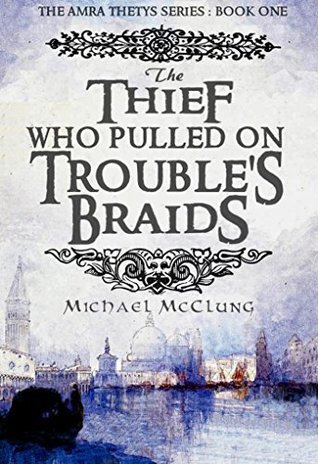 My July TBR included some of the books who were annual champions in Mark Lawrence’s Self-Published Fantasy Blog-Off (SPFBO). “The Thief Who Pulled on Trouble’s Braids”, Book #1 in “Amra Thetys”, is one such novel.
My July TBR included some of the books who were annual champions in Mark Lawrence’s Self-Published Fantasy Blog-Off (SPFBO). “The Thief Who Pulled on Trouble’s Braids”, Book #1 in “Amra Thetys”, is one such novel.
At less than two hundred pages, this was a little book that could, taking out other typical fantasy behemoth-sized contenders to snag the title in the inaugural SPFBO, year 2015. After reading it, I can see why it fared so well in the contest.
Taking place in a grim, bleak, and dangerous urban setting called Lucernis, in a populated northern continent of McClung’s imaginary world, the story of “The Thief Who Pulled on Trouble’s Braids” unfolds.
The guts of the plot is rather straightforward, and may sound familiar. Thief is down on their luck, and does not have the most savoury of friends. Thief’s rakish, charming fellow miscreant friend and occasional business partner, is mixed up with bad people who owe him.
Charming reprobate friend asks thief to hold onto friend’s dog, because friend is going to meet with the bad people who owe him, and is not entirely optimistic that he will survive the meeting. Coincidentally, friend also wants thief to stash an artifact for him, that it likely not worth all the trouble it will undoubtedly bring the thief’s way. Against better judgement and because she’s got a soft spot for reprobate, thief agrees to keep both mutt and merchandise. Friend says if he does not return in a day or so, that he’s likely been murdered. Sure enough, this is exactly what happens.
Thief is intially pegged for the murder, but with the assistance and intervention of the victim’s brother, a powerful but cynical mage who is a regular ally of the thief, and some other interesting characters who are not necessarily very moral, upright, or upstanding citizens, thief manages to begin the search for the real killer, determined to avenge her slain charming reprobate friend.
It all starts with the characters for me, and McClung shines here. The thief, Amra, is definitely shaded in grey, but tough, determined, resourceful, snarky, and ultimately a loyal and dedicated friend. She exhibits a lot of integrity, and a refusal to give up, or give in, and bow down to superior forces. She’s at the bottom of society, but refuses to act completely like someone who is downtrodden. She’s caring and empathetic, willing to be vulnerable, and the reader will find herself rooting for her. What I also loved is that her inner beauty surpasses her outer beauty, and she feels very real and fleshed out.
Holgren is also an awesome character. His appearance is innocuous, but he is completely bad-ass, and with a ready quip, a handy spell, or gob-smacking display of power, he’s a great sidekick for Amra. He’s obviously very intelligent, and he believes in Amra. His trust inspires the reader to believe in her too.
The murder mystery element is very well done, with plenty of guts, gore, and thrilling fight sequences. There’s also plenty of wit and sarcasm, which is also fantastic, with plenty of out-loud chuckle inducing moments. Amid the frivolity interspersed with the stabby moments, mysterious and malevolent soft magic mingles in nicely with the action.
There are capricious and callous gods (love this element), haunted blades, bloodwitches, monsters,
daemonists, mages, and a surprisingly detailed backstory, religions, and worldbuilding for such a short book (overview, history, explanation of the various ages noted at the rear of the novel).
Themes of loss, friendship, betrayal, jealousy, greed, poverty, desperation, and yet hope can be found in the book. Lucernis is a place where the vast majority of the populace exist, rather than thrive. There is plenty of economic disparity, crime, and preying on the less-fortunate. People do what they can to survive, and Amra is no different. But she does not succumb to despair, nor completely give into her worst impulses.
This book was headed towards a solid four-star read for me, until the last 30 pages. Something in McClung’s smooth and accessible prose, and where he took some of the themes at that juncture of the book, completely raised the bar, touched my soul, and elevated this book to something very special.
“A tool that cannot be reliably taken in hand, fit for no useful purpose: Was it even a tool, in any rational sense of the word?…’A workman relies on his tool to do the job at hand. His skill, his hand, guides the tool. A tool that turns in his hand should be discarded.’…’But no responsible craftsman would leave a dangerous tool lying around for any fool to pick up. Even swords, meant only for killing, come with scabbards.'”
“The Thief Who Pulled on Trouble’s Braids” is a dark, fast-paced, and yet very rich and complete-feeling story, that seems very self-contained, while leaving plenty of room for interesting sequels.
4.75 stars for this excellent book, no doubt worthy of the first SPFBO championship.
Buy from Amazon
THE THIEF THAT PULLED ON TROUBLE’S BRAIDS•THE THIEF THAT PULLED ON TROUBLE’S BRAIDS•THE THIEF THAT PULLED ON TROUBLE’S BRAIDS•THE THIEF THAT PULLED ON TROUBLE’S BRAIDS•THE THIEF THAT PULLED ON TROUBLE’S BRAIDS•THE THIEF THAT PULLED ON TROUBLE’S BRAIDS•THE THIEF THAT PULLED ON TROUBLE’S BRAIDS•THE THIEF THAT PULLED ON TROUBLE’S BRAIDS•
The post Review – THE THIEF WHO PULLED ON TROUBLE’S BRAIDS – by Michael McClung appeared first on BEFOREWEGOBLOG.
An interview with #SPSFC Finalist T.A. Bruno Author of In the Orbit of Sirens
Check out our continuing series featuring authors from the finalist competition of The Self Published Science Fiction Contest.
An Interview with #SPSFC Finalist Cameron Coral of Steel Guardian
An Interview with SPSFC finalist G.M Nair of Duckett – Dyer: Dicks For Hire
 BWG: What do you think makes a good story?
BWG: What do you think makes a good story?
TB: Hi Beth, thanks for having me! Great question right out the gate. I find myself drawn to stories with unique worlds and loads of adventure. I like to feel like I’ve covered a lot of ground from the beginning of the book to the end. The weirder the adventure, the better. I have a pretty broad scope when it comes to reading, but that description fits my favorites.
BWG: How did you get into writing? Were there any catalysts in your life that set you on your path to loving the written word?
TB: Ever since I was a kid, I was writing little comic books for my third-grade class. I’ve been chasing that dopamine hit ever since. Multiple times throughout my childhood and schooling, I had attempted to create a novel, sometimes side-stepping writing in favor of other mediums because I wasn’t confident in my skills. It was only after I was outlining a short animated film that was initially going to be In the Orbit of Sirens that I realized I finally had enough meat there to do something bigger. It was not going to fit into a snug 5-minute short. I convinced myself it was worth it to try, even if I could fail. I buckled up and began outlining. I have now finished my trilogy, and people are enjoying the world I built, so I am delighted I pushed myself to try.
BWG: What comes first for you, the plot or the characters, and why?
TB: I’m a plot first guy. I outline the flow of the story first, what needs to happen to the world, then I go back over it and learn what my characters might learn about themselves or the world during those events. There are Pantsers and Plotters, but I consider myself a Gardener. I plan the field to sow, but what grows is natural. When I am finally in the thick of writing, I have all my pieces in the right places, and my characters still surprise me when confronted with the situation I laid out. I do this to have a complex plot and get the most impact from my characters.
BWG: How was your first SPSFC? If you have other books, Do you think you will submit them to future contests?
TB: I loved my experience with the SPSFC. I was convinced I’d be eliminated within the first round when it began. I was thrilled I made it to the semi-finals, then floored when I became a finalist! In the Orbit of Sirens ended up placing 5th, and I couldn’t be prouder! If other authors are reading this, I highly recommend joining if you can. The exposure was great, my sales increased, and I met many other excellent authors and bloggers. Seriously, I wish I had more books so I could enter it again, but I wish the best of luck to SPSFC2’s contestants.
I look forward to seeing it play out without the pressure of hoping to win.
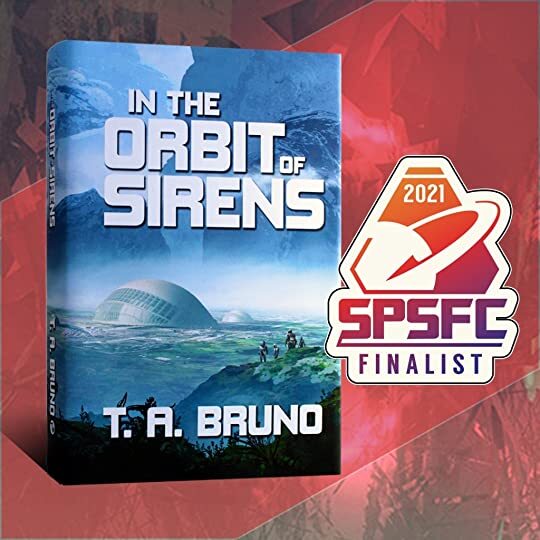 BWG: What was the best part of the SPSFC experience?
BWG: What was the best part of the SPSFC experience?
Getting to meet other bloggers and authors. I feel like my writing sphere got larger. It was also fascinating seeing all the reviews from the judges. Just overall a positive experience.
BWG: For readers unfamiliar with your work, can you tell us about your SPSFC entry?
In the Orbit of Sirens
The Song of Kamaria Trilogy, Book 1
by T. A. Bruno
THE LAST FRAGMENTS OF THE HUMAN RACE ARE FORCED TO ADAPT TO A DANGEROUS NEW WORLD OR FACE EXTINCTION.
When starship mechanic, Denton Castus, is caught in the destructive path of a devastating war, he abandons his home and seeks refuge on a distant planet. However, this new safe haven has undiscovered threats of its own. Eliana Veston, a scout preparing the planet for the refugees, struggles with a deadly pandemic that is killing off colonists. The hunt for a cure unleashes a new threat to humanity—the Sirens—mysterious beings with incredible powers and a deep hatred for invaders.
BWG: Where did you get the idea for your book?
TB: In the Orbit of Sirens is a culmination of decades of ideas spinning around in my head. I mentioned before that I used to make comic books for my third-grade class. That was the initial “brain bug” that I occasionally developed throughout my life. Sure, almost nothing survived from that initial comic book, but it got the gears churning. In college, I tried the comic book again, this time with a lot more skill. I made the mistake of attempting to “Pants” it, just plow into it and see where it goes, but my ideas were too complex to just ramble through. I put it aside until years into my career. I tried to once again write it and failed. 6 years ago, I decided to try outlining the damn thing, and finally, it had legs. I wrote it to make the 3rd-grade version of myself happy.
BWG: What was your most brutal scene to write, and why?
TB: oof! This is a tough one to answer because my readers know I can be pretty mean to my characters. I’m going to answer as broadly as possible and say, “ALL of At the Threshold of the Universe (Song of Kamaria #3) is the most brutal scene.” Which is unfair, but that’s what I’m going to roll with.
BWG: What is a significant way your book has changed since the first draft?
TB: In the Orbit of Sirens was originally about double the length in the first draft. I had started my story in the wrong place, and there was too much “shoe leather” in the book. The characters didn’t make it to Kamaria until part 2. It wasn’t until my last beta reader suggested, “Hey, why not start the book on Kamaria with Eliana?” I churned that idea in my head and realized it was brilliant and not-to-be-ignored. I rewrote it, saving Denton and Eliana’s first interaction for part 2 instead of having Eliana and John Veston on the Telemachus with everyone. I feel like it worked. We’re all on Kamaria from page 1, which changed Eliana’s story’s flow to be way more interesting. Beta Readers are heros!
BWG: There is usually research of some form when writing a Sci-fi novel. Were there any exciting bits of research or rabbit holes you went down writing the book?
TB: Oh, for sure. I am an avid watcher of nature documentaries and a lover of trivia. Basically, anything I saw in those documentaries, I asked myself, “how would Kamaria do that?” Kamaria is “Earth-Like” but also 5 steps removed from what we understand.
If we’re talking serious research, On the Winds of Quasars (Book 2) features characters from the Deaf Community. I reached out to people in that community to help me create authentic characters and bring Sol-Sign, an adaptation of American Sign Language, to the story. I had a Deaf Consultant as well, and their involvement was amazing. I learned so much about their community and unique culture, and people seem to love the characters birthed from that process. It made the world feel more beautiful.
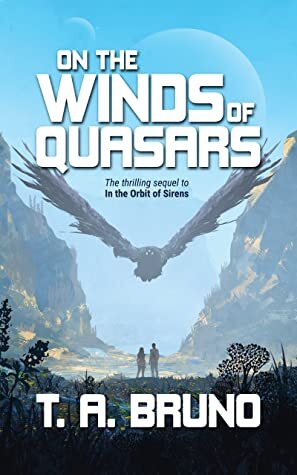 BWG: What do you have coming up in the future?
BWG: What do you have coming up in the future?
TB: At the moment, I just released At the Threshold of the Universe (Book 3) a few months ago, and I’m tapped out of energy. I have some brainstorms on the horizon, things that involve Kamaria but won’t require reading the trilogy to understand in case new readers want to hop in elsewhere, but so far, those are just rumblings of ideas. Until the right story finds me, I’m keeping busy digitally sculpting all of the creatures and characters in the trilogy to create a companion book. A cool little art book/nature document that fans can explore and refer to remember all the cool natural elements of Kamaria. I don’t know when I will have that ready, it might be a far way off because the art involved takes time to do right. But it’s been fun!
Thank you for having me on your blog. I really enjoyed this interview—excellent questions!
Cheers,
—TA
Buy In the Orbit of Sirens from Amazon
in the orbit of sirens•in the orbit of sirens•in the orbit of sirens•in the orbit of sirens•in the orbit of sirens•in the orbit of sirens•in the orbit of sirens•in the orbit of sirens•
The post An interview with #SPSFC Finalist T.A. Bruno Author of In the Orbit of Sirens appeared first on BEFOREWEGOBLOG.
August 4, 2022
Review: Daughter of No Worlds by Carissa Broadbent
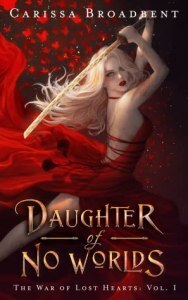 Daughter of No Worlds could be considered a fantasy romance or a romantic fantasy, depending on who’s describing it. The line between these two subgenres is a nebulous one, and in truth it’s more of a continuum. They say if you can take out the fantasy and you still have a love story it’s fantasy romance, and if you can remove the romance and still have a fantasy story it’s romantic fantasy. There are rare books that perfectly straddle the line between these two genres, where the fantasy and the romance are two halves of one seamless whole, interdependent, almost symbiotic.
Daughter of No Worlds could be considered a fantasy romance or a romantic fantasy, depending on who’s describing it. The line between these two subgenres is a nebulous one, and in truth it’s more of a continuum. They say if you can take out the fantasy and you still have a love story it’s fantasy romance, and if you can remove the romance and still have a fantasy story it’s romantic fantasy. There are rare books that perfectly straddle the line between these two genres, where the fantasy and the romance are two halves of one seamless whole, interdependent, almost symbiotic.
Daughter of No Worlds by Carissa Broadbent is just such a book, a flawless symphony of immersive fantasy and enthralling romance, tied together by prose that is by turns gorgeous and profound. It easily cracks my top 10 books I have ever read, in any genre, and I urge you to pick it up and begin reading it today.
The first thing that drew my attention was the prose. Broadbent’s writing shows passion, insight, and fine attention to detail. I stopped highlighting passages in the book because I found myself highlighting entire paragraphs on page after page. Some, just because the language was beautiful:
Shadow doused the hard panes of his face, but his features were so sharp that they sliced through the dusk, meeting mine with equal determination and wary curiosity.
Others because they hit my feels like a freight train:
I didn’t make myself all of these terrible things—a whore, a killer, a traitor—just to be ignored and discarded before it could be worth something.
And some just because they made me laugh:
I quickly learned that Max was apparently only “made for” an exceptionally narrow set of environments, temperatures, activities, and interactions.
I also noted something I don’t see very often in books: the perfect mastery of sentence variation. I know, it’s a writer-nerd thing to say, but many writers lean heavily into either exceptionally tight or exceedingly flowery prose. Broadbent threads the needle, keeping her sentences short and punchy when necessary, but she’s not afraid to let loose with her considerable linguistic firepower when the occasion calls for it. This speaks to discipline, and the result is a book that’s eminently readable, despite its rather chonky length.
The characters are beautifully rendered and heartbreakingly real, especially Tisaanah, whose reaction to her considerable past trauma is to fight to make the world a better place. The trauma is on the page, present in her thoughts and reactions, but her character is not defined by it. She uses her experience to become more effective, more insightful, and stronger. Yes, she has rage—understandable given what she’s been through—but she’s more than just a reaction to her trauma. She’s a whole person who uses her experience to learn and understand, then takes that knowledge and puts it into action.
Max is a delight as well, with layers of complexity beneath his sugary, sarcastic exterior. He has a troubled history as well, which is revealed in perfectly balanced stages as Tisaanah’s bullheaded tenacity cracks his silky-smooth veneer. You can’t help but root for these two, but BOY HOWDY is this a slow burn. I’m not complaining (much) because the author makes us suffer and pine in such delightful ways, and isn’t this half the reason we read romantic stories?
The fantasy story, and the magic in particular, includes some common tropes that Broadbent breathes new life into, as well as some totally innovative stuff that caught me by surprise. The main antagonist, for lack of a better word, is a unique creation that I absolutely can’t tell you more about, but it’s what you come to fantasy for: magical beings like you have never seen before. I’ll be honest: I came to the book because of the romance, but the fantasy story is first-rate.
But back to the romance. I mentioned that it’s a slow burn, which is not always my first choice, but it’s truly earned. Both characters’ experience with trauma renders them unwilling to let anyone else in, which—okay, you might think you’ve seen that before, but not like this. It’s not the usual bad-boyfriend/girlfriend-scarred-me-for-life story. It’s more than that, with layers upon layers, and the fantasy story is all tied up in the romance in all the best possible ways. And when the sainted moment finally arrives, Broadbent delivers the goods with a perfect mix of heat and emotion. The intimate scenes are gorgeous, just spicy enough but not at all mechanical, giving you everything you need while leaving you begging for more.
Daughter of No Worlds should be considered a classic of modern fantasy, and it’s a must-read for fans of slow-burn romance as well.
Forget your TBR. Your next read has arrived.
Review: A Mirror Mended by Alix E. Harrow
Buy from Amazon ADD ON GOODREADS
The post Review: Daughter of No Worlds by Carissa Broadbent appeared first on BEFOREWEGOBLOG.
August 2, 2022
Review – A Mirror Mended by Alix E. Harrow
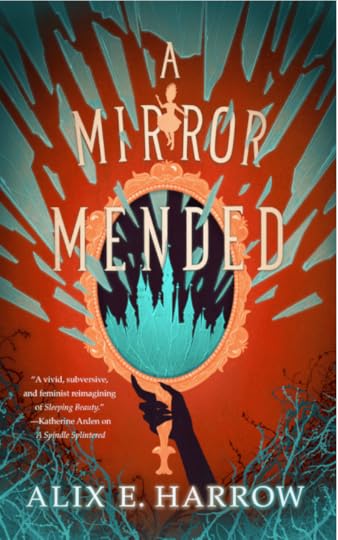 It has been an exciting five years for our dimension traveling heroine, Zinnia Gray. We have moved past the traditional simple sleeping beauty type stories and into just about every variation on theme that can be imagined. Every country, every type of world, and even some off-world, Zinnia has stepped in and did her best to “help” the titular princess. She has burned fifty spindles. “Just when Zinnia’s beginning to think she can’t handle one more princess, she glances into a mirror and sees another face looking back at her: the shockingly gorgeous face of evil, asking for her help.”
It has been an exciting five years for our dimension traveling heroine, Zinnia Gray. We have moved past the traditional simple sleeping beauty type stories and into just about every variation on theme that can be imagined. Every country, every type of world, and even some off-world, Zinnia has stepped in and did her best to “help” the titular princess. She has burned fifty spindles. “Just when Zinnia’s beginning to think she can’t handle one more princess, she glances into a mirror and sees another face looking back at her: the shockingly gorgeous face of evil, asking for her help.”
Now, what fairy tale do we know of that has a gorgeous face of evil staring into a mirror?
It is none other than the worst of evil stepmothers, the poisoner of many apples, The Evil Queen, and she needs help. Although at the time of jumping through the mirror, Zinnia did not know that. Even the worst of the worst might have a redeeming quality buried deep inside them, and they need a better ending than to be put in hot metal shoes, or crumble and wither to dust. Or, if you take the Disney version, driven off of a cliff. Either way, The Evil Queen’s future is one of horror, and she wants a new ending.
“You have to make the best of whatever story you were born into, and if your story happens to suck ass, well, maybe you can do some good before you go.”
I have often said that Alix E. Harrow cannot write a bad thing. For me, her stories always resonate. When I hear that she will have a new release, I look forward to it for months. A Mirror Mended is no different. I highly enjoyed this story, with a few caveats. Like the first in this series, Zinnia is snarky and likable. I get her humor; maybe it is because I, too, have quite the sardonic tongue. A Mirror Mended is a story that does not take itself too seriously. How could it? Fairy tales, while important culturally, are often a bit tongue and cheek. I am glad that Harrow moved on to another fairy tale just as dark as Sleeping Beauties. Disney sure does enjoy tarting up stories for the masses, especially when the underbelly of the story is figuratively infested with worms.
Harrow is also a master world-builder. Granted, the world of Sleeping Beauty and Snow White were reasonably solid from the original stories, but she takes all those ideas and convincingly twists them. It is one of the things I enjoy about her as an author; she knows how to make the unbelievable into the believable.
“The mirror showed me you, out of all the possible people in all the universes,’ It sounds almost like an apology. ‘Why?’
‘Well, what were you doing at the time?’
‘I was looking into the mirror, obviously. Wishing for a way out.’
‘Well, so was I. As it happens.”
The caveats as mentioned above are that Zinnia’s quippyness, her snark, came off less as a popping soap bubble of humor and more like a defense mechanism, and given the context of the story, it didn’t quite fit right for me as a reader. This might be entirely on me and what I see in Zinnia as a character, but often her dialog seemed too forced. And in a story this short, something like that can quickly drive out a reader, as it did with me.
Even with this sidenote, this is a hell of a good story. Her record for writing killer novels and short stories continues. I highly recommend this as a nice little jaunt into fairy tales. Make sure you read the first novel, A Spindle Splintered, first so you can get all the references and enjoy Harrow’s mastery.
Buy from Amazon
A MIRROR MENDED•A MIRROR MENDED•A MIRROR MENDED•A MIRROR MENDED•A MIRROR MENDED•A MIRROR MENDED•A MIRROR MENDED•A MIRROR MENDED•
The post Review – A Mirror Mended by Alix E. Harrow appeared first on BEFOREWEGOBLOG.
August 1, 2022
Review – Legends & Lattes by Travis Baldree
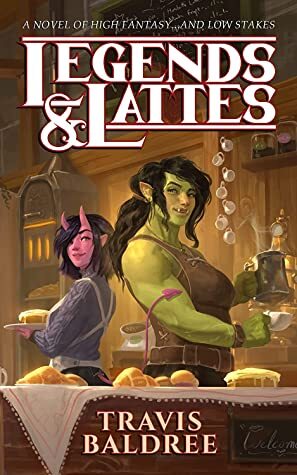 Legends & Lattes by Travis Bladree is a fantasy story wrapped in a warm hug with a side of scones and a perfectly creamy dark roast latte. Travis Baldree, the famous audio narrator, has offered a gift to the reading world with an un-schmaltzy story that even the hardest of grimdark readers can get behind.
Legends & Lattes by Travis Bladree is a fantasy story wrapped in a warm hug with a side of scones and a perfectly creamy dark roast latte. Travis Baldree, the famous audio narrator, has offered a gift to the reading world with an un-schmaltzy story that even the hardest of grimdark readers can get behind.
“it was like drinking the feeling of being peaceful. Being peaceful in your mind. Well, not if you have too much, then it’s something else.”
The story follows Viv, an Orc, as she leaves her bloodstained warrior days behind her. She came to a moment where she knew she would never find happiness in her current profession. Plus, there was that magical cup of wonder she had at that gnomish city a while ago. It was time for her to set down the sword, pick up the dish towel, and hopefully find some peace.
She finds a city that is not too large, not too small but is a perfect size. She finds a property in disrepair and goes to work. Firstly, no one but her knows what coffee is. They drink tea here, for shame. Secondly, she has no staff; thirdly, her “coffee house” is a horse stable. She is going to need some help.
And I think that is the point, she no longer has to do everything alone; she can make relationships and does. Great ones. Viv stumbles here and there, but her friends help her get through the worst things using their best skills. I like that Bladree shows that people can change and can grow.
While this is a hopeful fantasy, hope punk, if you will, there is still conflict. This slight conflict kept the story from going too sticky-sweet. Instead, the variance of the story helped balance out the elements. Travis Baldree knew what to do to make the story balance out.
If you enjoy cozy stories that warm even the coldest and deadest of hearts, read Legend & Lattes. Use it as a refresher between bouts of Mark Lawrence or Joe Abercrombie. Sometimes the world is not as heartless as we think and a warm, perfectly made cup of coffee is all it takes to make everything all better.
Check Out Some Reviews of Legends & Lattes and an Interview with the AuthorInterview With Author Travis Baldree
Review -Legends & Lattes by Travis Baldree
Review-Legends & Lattes: A Novel of High Fantasy and Low Stakes by Travis Baldree
Buy from Amazon
LEGENDS & LATTES•LEGENDS & LATTES•LEGENDS & LATTES•LEGENDS & LATTES•LEGENDS & LATTES•LEGENDS & LATTES•LEGENDS & LATTES•LEGENDS & LATTES•
The post Review – Legends & Lattes by Travis Baldree appeared first on BEFOREWEGOBLOG.
July 31, 2022
Review – Ledge by Stacy McEwan
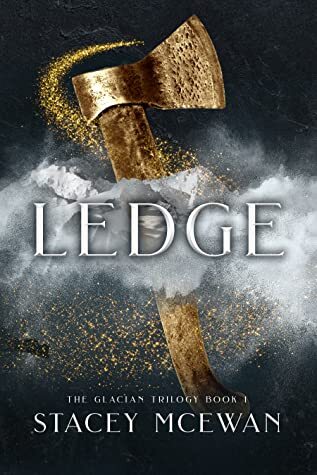 Ledge, a new fantasy story by famed BookToker and author Stacey McEwan, is frosty, sizzling, and spicy all at the same time.
Ledge, a new fantasy story by famed BookToker and author Stacey McEwan, is frosty, sizzling, and spicy all at the same time.
The story’s premise is thus. Dawsyn, a young human adult, lives on what is called Ledge. It is an icy outcrop up high in the mountains. Her tiny village scratches a meager existence from the trees and small game, begging, pleading, and killing their way through life. Life is hard. No one can leave. If you try to go, you have two options. First, you can fall to your death as a victim of the vast chasm that excises her tiny village from everything beyond it. Or as a human sacrifice to the Glacians.
The Glacians are another species that thrives in cold weather, is incredibly strong, flies, and has talons and sharp teeth. From an evolutionary standpoint, they out predate humans by quite a lot. Every season, like clockwork, the Glacians come and steal a member of the town. Why they do this is unknown, it is said that they eat humans and chew on the very bones of townsfolk. However, that’s just chatter; no one in the village knows the true reason for this, and if they do, they aren’t sharing their secrets.
Dawsyn, our story’s protagonist, is alone. Her family, her tribe as it were, has died from various things. Her sister was taken as tribute, her mother is gone, and her grandmother has died from a cough. She is alone, scratching it out, defending her trees and the future warmth they can provide. It isn’t much, but her strength of will sees her through each day. “but her luck has run out. She is chosen and ripped from her icy home, the only world she knows. No one knows what will happen to her on the other side, least of all Dawsyn. Murdered? Enslaved? Worse?Thankfully, the fates align and Dawsyn manages to escape their clutches with the help of a half-Glacian called Ryon.” The question is, who to trust?
While this story is, in many ways a typical trope, two enemies from disparate worlds come together and find something between them; McEwan does quite well with the dialog and the world-building. I like both characters well enough, and the Glacians are an exciting twist on tired fantasy characters. There is most definitely a good level of spice in this book which is all sorts of fun—but not done so in a totally and utterly unbelievable way. Definitely not insta-love here.
I enjoyed this reading experience thoroughly. Is it groundbreaking, not really? But she pounds away typical tropes and makes every line hers in writing. Nothing felt stagnant, the pace was excellent, and one moment flowed through to the next. I found myself staring at the clock at 3 am, wondering where the last four hours went, which is a solid hard win in my book. 5 Stars from a very bleary-eyed reader from staying up to late, and hell yes, I would do it again.
I recommend this book, and I am dying to read the next book.
Buy from Amazon
ledge•ledge•ledge•ledge•ledge•ledge•ledge•ledge•
The post Review – Ledge by Stacy McEwan appeared first on BEFOREWEGOBLOG.



